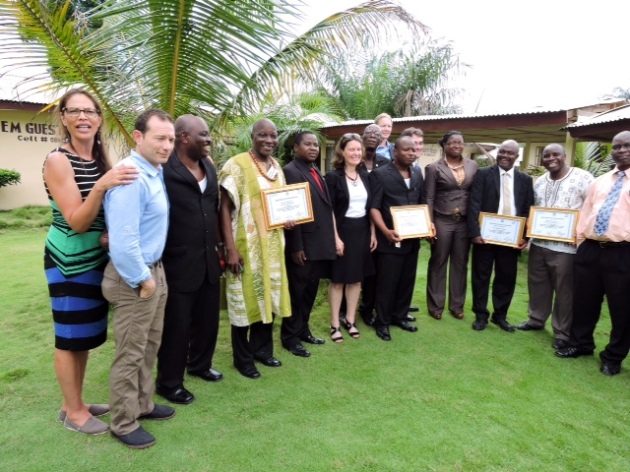In the post below, NACDL Indigent Defense Counsel John Gross describes the fifth and final day of the training workshop.
20 June 2014
Friday had seemed so far away when we unpacked our bags last Sunday, but now it was upon us. We had to catch a flight out of Monrovia at 6:30 p.m., which meant that we were going to have to leave Kakata by 2:00 p.m. That left us only a half day for our final training session, but we were determined to make the most of it. We planned on covering summations, jury instructions and sentencing.
Elizabeth Kelley began the day with an excellent presentation on closing arguments. Having already excelled at developing case theories and giving opening statements, we assumed that the Liberians would be able to deliver powerful closing arguments and that assumption proved to be true.
One of the things that we decided we would discuss with the Liberians was the importance of jury instructions. When Rick Jones visited Liberia several months ago to do an assessment of training needs, the Liberians had not identified jury instructions as a training priority. However, as we researched Liberian Supreme Court decisions, it became clear that the failure of defense counsel to request specific jury instructions or to object to charging errors made by the trial judge occurred fairly often. It became easy to understand why this occurred once the Liberians told us that not only are there no pattern jury instructions in Liberia, but that they typically have to make a specific request to the trial judge to charge the jury on basic legal principles like the presumption of innocence and the burden of proof. We worked with the Liberians on creating a set of sample jury instruction for claims of self-defense and they immediately understood how these instructions would inform their theory of the case, their opening statements and their closing argument to the jury.
Another topic of discussion was how to make complex legal concepts understandable to jurors who may have very little formal education and who may not appreciate the role that a public defender plays in an adversarial system of justice. One idea that we came up with was for the Liberians to use stories from the Bible to illustrate legal points to the jury. God’s assurance to Abraham that he would not destroy Sodom if there were but five righteous men living there could be used to convey the need for proof beyond a reasonable doubt. The story of Susanna and the Elders could be used to show the importance of cross examination. The Liberians agreed that using Biblical examples of legal principles would make a tremendous impact on jurors.
Finally, we turned our attention to sentencing. One initial question we had was whether Liberians have the opportunity to do pre-pleading and pre-sentence memoranda. The idea of a pre-pleading memorandum started a discussion about plea bargaining and revealed an interesting difference between the plea bargaining system in Liberia and the one here in the United States. In Liberia, if the prosecution and the defense agree that the defendant will plead guilty to a lesser offense than the one charged, then the trial court must accept that plea in satisfaction of the charges. However, the prosecution and the defense may only recommend a sentence; the judge retains the discretion to impose any sentence authorized by law. We also learned that the period between conviction and sentence is typically just four days in Liberia and that the defense attorney only has ten days following a conviction to file with the trial court a “bill of exceptions” which will serve as the basis for an appeal.
Throughout the week, we were amazed by the challenges that the Liberian public defenders have to face. As we spent our last few hours with them, we began to have a feeling similar to the one you experience when a jury is deliberating. The question we couldn’t help but ask ourselves was: “Have we done enough?” We got our answer during the final few minutes of the training. While they all said they wished the training was longer and expressed their hope that we would be able to return to Liberia to do additional trainings in the future, they also said how excited they were to try out the techniques and strategies we had shared with them. Their passion and determination were once again on display. The Director of the Judicial Institute who had attended the training was one of the last people to speak. He said that he firmly believed that our training and the manuals developed by NACDL would result in fundamental changes to the way public defenders practice criminal defense in Liberia.
As we made our way through customs at the airport later that afternoon, I glanced down at my passport and noticed the seal that was on my visa. It depicts the ship the Elizabeth,which brought the first African American settlers to the shores of what would become the Republic of Liberia and the motto “The Love of Liberty Brought Us Here.” As you might expect, that motto generates quite a bit of controversy within Liberia since it refers only to the small group of settlers that would come to be known as “Americo Liberians” and would rule the country for over 150 years. Still, I couldn’t help feel that it was a fitting reminder of why NACDL, as an organization, decided to work on this project. There is no place that NACDL, Liberty’s Last Champion, will not go to help protect the rights of the accused. Wherever we go, it is the love of liberty that leads us there.

